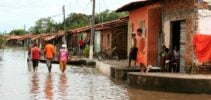The UN Human Rights Committee concluded that Australia's failure to adequately protect Torres Islands indigenous people from the adverse impacts of climate change violated their rights to enjoy their culture and to be free from arbitrary interference with their private life, family and homesystem. (UN News*)
ADVERTISING
The Committee issued the decision (🇬🇧) in late September, after examining a joint complaint filed by eight Australian citizens and six of their children. They are all indigenous inhabitants of Boigu, Poruma, Warraber and Masig, four small low-lying islands in the Torres Strait region of Australia.
Islanders claimed their rights were violated because Australia had failed to adapt to climate change by upgrading island dikes and reducing greenhouse gas emissions.
“This decision marks a significant development as the Committee has created a pathway for individuals to make claims where national systems have not taken appropriate measures to protect those most vulnerable to the negative impacts of climate change in the enjoyment of their human rights,” it said. Hélène Tigroudja, member of the Committee.
ADVERTISING
This is the first opinion from an international human rights body upholding a State's duty to protect people under its jurisdiction from the impacts of climate change and to compensate and repair climate-induced harm. The decision recognizes that inaction in relation to climate change can be the basis for assuming international responsibility by a State.
Read also
(🚥): may require registration and/or signature
(🇬🇧): content in English
(*): content in other languages is translated by Google Tradutor




